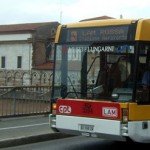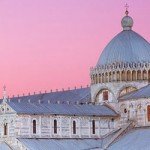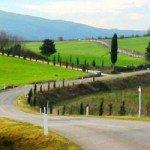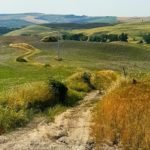The tourism panel at ToscanaLab 2010 resulted in an interesting “manifesto” made up of 5 points. In order to make sure ToscanaLab was a useful experience, I think some “soul-searching 2.0” is in order. So I thought that, as people in the tourism business, we should probably ask ourselves what we do or should do to comply with the 5 points of the manifesto.
1. Changing perspective: from “me” and “you”, to “us”.
Travelers and people in the tourism businesses should stop working as two separate categories and instead they should work together to create a better tourist experience. Of course there are many different ways in which the different domains in the tourism sector can apply this first “recommendation”.
As far as we are concerned, we participate in online communities and social media so that we can interact with the travelers to our area. This has the double advantage of (hopefully) being helpful to people who want to visit the area, and of gaining a lot of useful information on what they expect and hope to find when they arrive. This way we can try to offer something that makes them happy, even if on occasion, we have to “adjust” their expectations to the reality of what they will find.
We also try to interact with our guests when they are here as much as possible. We like to get to know them both before they show up and after, so that when they finally arrive, it feels like those friends you haven’t seen for a long time are finally here. Unfortunately, work sometimes prevents us from dedicating as much time as we would like to our guests.
2. The web is a real space, not just a means
The web must not be just another advertising platform. The web is a real place where real life happens, where we meet our guests and colleagues, make friends, create relationships. We have been extending our lives from off-line to on-line for a few years now. I feel quite confident when I say that many of the people I have met online are indeed friends.
We do not just promote our properties, we promote our area, via this blog, via our presence in forums, via Twitter, and Facebook. And not just in the hope of getting more guests, but in the hope of making people discover where and how we live.
This comes from our belief that tourism is not just “being in a place” or “seeing a place”, it is experiencing a place, living it with its peculiarities, and with its good and bad sides. I do not believe that a territory should change to meet the demand. The demand should be created among those people who are interested in seeing what a territory is and what it offers (and not what they expect it to be and to offer), otherwise we become just a uniform brand with no individuality. I believe that, even thorugh all destinations can be sold to anybody, the truth is that not all destinations will make everybody equally happy.
Ultimately, online we present ourselves, who we are, what we do, what we believe, in the hopes of finding like-minded people who enjoy what we enjoy and therefore to whom we can cater to the best of our abilities.
And here I think point 1 and 2 meet.
I hear people talk about the importance of instant booking. We will never, ever offer that.
We want to have contact with the people we welcome into our homes before we accept a booking. We want to make sure they know what they will get, and that the “us” will work. We need to know that they are the type of people who will be happy with what we are and what we offer and with the philosophy that forms the foundation of our work. To do this, we need to meet in this “Mid-Earth” called the Web and interact as in real life to see if we and you can really be us. If not, then we have never been afraid to say “sorry, we think you are looking for something we cannot offer“.
And here we move to the third point.
3. Internet helps extend the travel experience
Internet helps extend the travel experience because it includes the pre-trip stage, during which people gather information and build their holiday, the on-trip stage, when people use the web to enhance their experience through mobile devices, and the post-trip experience, when people tell their travel story.
I have already described what we do at the pre-trip stage. We also do another thing: we try to figure what people are interested in these days and look for aspects of our territory to satisfy those needs. In this sense I think we also comply with the importance to listen.
But I am not sure we are going all the way for the reasons I mentioned above.
We look into what the territory naturally has to offer; we might try to find ways to make those aspects more prominent but we do not advocate a change that follows the demand of the market, as we see that as a transformation that in the long term will make the territory something it is not.We listen and we try to find ways to respond, whenever possible.
At the post-trip stage we try to keep in touch, we ask our guests to send us photos, write reviews, reports, tell their story, help us provide other travelers with insights into what the area and our properties have to offer. This has proved the most valuable thing over the years: first, it helps us avoid autoreferentiality and second it gives us different points of views on the things we look at every day.
Who knows the tourist potential of an area if not the people who have discovered it as tourists?
We value our guests’ feedback above anything else, and through the years I have to say that they have taught us quite a few things. I have lived here all my life, and now I see my home area with completely different eyes. It is a very interesting exchage.
I have left the on-trip stage for last because this is the most difficult. First, the infrastructure is not ready. Or not always ready. In areas like the Maremma, it is sometimes impossible to get a cell phone signal, never mind 3G coverage. Mobile devices are not a viable option most of the time.We now offer internet access to our guests. We invite them to keep a blog or an online journal while they are vacationing in the area so that others can see what spending some time here means. Not many do that, of course, and rightly so… not everybody is a nerd like us! People have lives! They are probably on holiday to run away from their computers, so we cannot ask them to spend time at their desk when they are on holiday too!!! But we hope to work on this stage with those who will want to participate through a few ideas which we will try and implement as soon as we have time to put online the new websites… the old ones are disgraceful but time is limited…
4. The information gap between travelers and tourism professionals needs to be closed.
Traditionally, those who offered a service had all the information, hence the power. Now travelers have a wealth of resources and information and hence the power. Not sure what we should do here besides helping by adding to that information and becoming ourselves sources of information.
Ideas?
5. The traveler as a “channel”.
Travelers are looking for an experience and not just for objects to look at. They then become the best channel through which the good news about that experience is spread. We know that, we always have. And for this reason we have always tried to offer more than just accommodation in Tuscany, we have always tried to offer an experience into our way of life. And we have always asked people to tell other people about it. The good and the bad. And they have.
I think what I wrote above goes to explain how we treat this aspect too.
Taking a stock
So what is the result of my soul-searching 2.0? I am not sure.
I see large space for improvement in our practice as far as point 3 and the on-trip stage are concerned. I am not sure what to do differently with regards to the other points.
Have we been doing it wrong in the past? Have we always been doing what people are now noticing should have been done and we had no idea we were doing it?
I don’t know. Any ideas, or suggestions, recommendations, etc are more than welcome.
Maybe the reason we found the debate a bit less surprising than we would have hoped for is that we have been working like this for a long time. Ok, maybe in an naive way, without the capabilities of the marketing professionals, or probably we do this in the wrong way, who knows…
Anyway, if the question is “did internet make your life better and how?” the answer is yes.
We have met an incredible number of great people and we have learnt to look at our home as a destination as well.
It’s a bit like being on vacation all the time.
Related articles
If you are interested in this kind of rumbling and mumbling, you might find the following of some interest:
- ToscanaLab 2010 Unplugged
- Elena Farinelli’s Blog – A summary of the points raised at ToscanaLab 2010 in the Tourism Panel (in Italian)
- BTO Educational – Internet Better Tourism Manifesto (in Italian)
I’d be glad to have other interesting links to add to this list. Please leave a comment (in Italian or English) with a link.









Your perspectives are sound worldwide, at least here in Savannah, Georgia USA. Your can-do spirit and matter-of-fact, get-it-done / here’s how approach are refreshing!
Great recap…these points very much reflect the evolution of my business style over the past 13 years, and specifically over the past 5ish years, and exponentially over the past 6 months.
There remains the conflict of interest (or, at least, perceived coi) problem for business owners who are also active participants in travel forums, especially those who blog and can’t reference their own blog posts without being called out for self-promotion.
It’s hard for me to say what the specific effect of social networking has been, as alongside newly FBing (professionally) and tweeting I also have a new site and a new blog and new portals. Not easy to isolate which means has been most successful, and I think the social networking effects are more difficult to pin down. More than booking results, I suspect that that activity is more useful for client relations and general visibility.
Unfortunately, I think the biggest factor is still seo. You can blog your heart out and be all over the networking sites, but if you don’t pop up first in a search you’re just navel gazing.
Great food for thought, especially in this new stage of networking/blogging for me. Things I’ve been pondering on my own, nice to see them articulated so well.
Thank you for your comments Sandy and Rebecca!
I understand perfectly what you mean, Rebecca. I am also under the impression that for tourism businesses the social media have more the advantage of helping us network with other people in the same field rather than making us more visible to travelers. Most of my contacts online are travel-related business I think, except on Facebook wher I have many of my former guests as friends.
I got thinking about these things because at ToscanaLab 2010 most of the emphasis was on social media. But I think social media are not so social in the end… in terms of promotion at least.
Of course there were people presenting how they use social media, but not a single case of best practice in hospitality as far as I could see. Eh well, in a little while maybe.